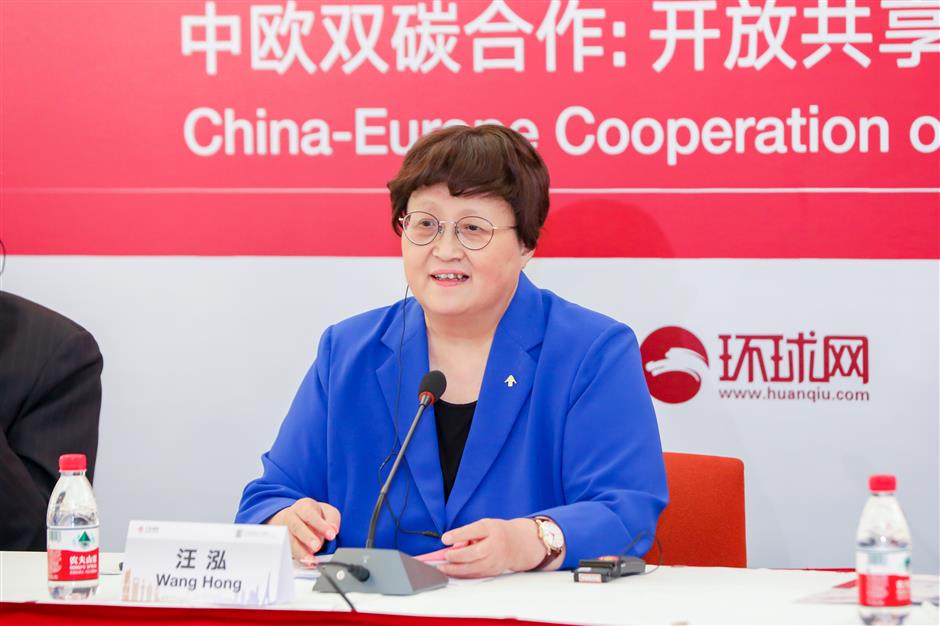Deeper China-Europe cooperation needed to achieve 'going green' targets
While going green has become a new growth and point of competition, it also serves as an opportunity for international cooperation in building a better world for all.
This was one of the key messages delivered at the CEIBS Insights Europe Forum this week that addressed the theme "China-Europe Cooperation on Decarbonization."
The event, co-hosted by China Europe International Business School (CEIBS) and the EU-China Business Association, took place concurrently on September 7 at dual venues in Brussels and Shanghai.
Participants exchanged views on a roadmap to net zero carbon emissions and a green economic recovery for China and Europe, stressing the need for deepening cooperation between officials, entrepreneurs and scholars.
Addressing issues like carbon neutrality, global environmental governance, green finance and sustainable economic recovery, the attendees made a compelling case for a green transition.
"A host of discerning personalities are gathered here today to discuss a very important issue of our times, an issue of global strategy, but also one that's philosophical," said CEIBS President Wang Hong in her welcome address.
Wang explained that the issue is philosophical because the international community has yet to reach agreement on the fundamental causes of climate change. This is despite the extreme heat this summer in many parts of the globe that suggests that global warming is a common challenge confronting all of us.
Tackling the problem allows no delay, Wang said.

CEIBS President Wang Hong
China has vowed a commitment to a green and low-carbon transition, promising peak CO2 emissions by 2030 and carbon neutrality by 2060. Achieving this, Wang said, would call for technological guarantees, strategic guidance and market promotion, with global entrepreneurial cooperation.
China and the EU, as major trading partners, are also critical actors in meeting global climate changes, and this affords significant room for consensus and cooperation in reaching the "dual carbon" objectives, Wang added.
Predictably, a green transition would instill new confidence in mutual business collaboration between China and Europe, she said.
EU-China Business Association Chairman Jochum Haakma observed that, despite the disruption caused by COVID-19, it is important for China and the EU to continue to work closely to achieve carbon reduction goals.
"The EU and China have a long-standing cooperation on climate change and have agreed to further steps to join efforts. More than ever, both sides need each other," he said, adding that, despite the pandemic, bilateral economic and trade demand remains robust, registering steady growth.
He said that direct investment from China in the EU, mainly focused on energy, infrastructure, consumer goods and motor vehicles, had also been growing. As a global leader in wind power and solar energy-related goods, China is of vital importance to the cause of emissions mitigation in Europe, he added.

EU-China Business Association Chairman Jochum Haakma
Wang Hongjian, Interim Charge D'affaires of the Mission of the People's Republic of China to the EU, also emphasized in his speech the importance of China-EU green cooperation.
"One of the biggest lessons we can take from nearly 50 years of China-EU relations is that although we may have different systems, this does not prevent us from finding common ground.
"Moreover, cooperation in carbon markets and sustainable finance also proves that China and the EU are partners, not rivals, and that cooperation is far greater than competition," he said.
Wang noted that China and the EU are at different stages of development and cannot be expected to be completely in lockstep on the road to carbon reduction and green development, and that disagreements are inevitable.
Nevertheless, he emphasized that both sides should meet one another half way to create an environment of mutual trust and fairness to promote green economic cooperation.
Wang stressed the importance of correct perception of bilateral relations, a rational definition of responsibility for climate change, policy consistency, mutual trust and rules to settle differences.
Pascal Lamy, former World Trade Organization (WTO) Director-General and a CEIBS distinguished professor, identified six points for beneficial cooperation between the EU and China: emission trading systems, trade, technology, finance, the ocean and forests.
Lamy also believes that both parties should ensure that geopolitics and short-termism do not slow the transition to zero carbon. In particular, he added that China and the EU should resist the temptation to postpone major efforts due to the current global energy crisis.
Since 2012, CEIBS has hosted 30 overseas forums in 10 countries and regions around the world, featuring more than 200 keynote speakers and attracting more than 8,000 participants from government, industry and academia.
With a focus on the most pressing issues of the day, these events serve to maintain open dialogue between China and the world and to promote cooperation in tackling challenges affecting everyone.















